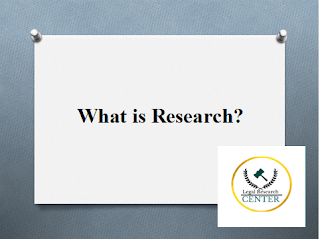
What is research definition
Kerlinger in 1973 defined research as a systematic control, empirical and critical investigation of hypothetical prepositions about the presumed relation among natural phenomena.
Tuchman 1978 described the research as a systematic attempt to provide answers to questions.
Keywords in this definition include; process, systematic collection, analysis and interpretation.
As a result, research can be characterized as a systematic method of gathering, analyzing, and interpreting data..
Research involves the following components.
1. It is systematic: It attempts to solve problems whether social, political, and cultural and health-related in a systematic way.
It is systematic in the sense that it adheres to a set of guidelines.
This involves the identification of the problem, review of the related literature and data collection.
The process of data collection requires proper organization and control so that the data will enable valid decisions to be made about the research problems at hand.
This is followed by data analysis, conclusion and recommendation.
2. It is objective: Research attempts to find an objective on bias solution to the problem.
Research involves gathering new data from primary and secondary sources using materials.
It is founded on empirical data or visible experience. It demands accurate observation and description.
Types of Research
Research can be qualitative or quantitative.
Qualitative Research
Qualitative research seeks to describe and analyze the culture and the behaviour of human beings and their groups from the point of view of those being studied.
An example of qualitative research uses natural settings, for instance, a classroom setting and not a laboratory (no experience).
This means the scenario is not artificial. Qualitative research relies on a flexible and interactive research technique.
This includes; interviewing, focused group discussions and questionnaires.
In qualitative research, feelings and insights are considered Important; their applicability.
Qualitative research is appropriate under the following conditions;
For example, when one wants to know the causes and effects of the certain phenomenon and the answer is unfamiliar to the researcher:
The effect of free primary education on school accessibility and retention or the effect of price increases on commodity consumption. It deals with description.
Quantitative research
It relies on the principle of verifiability. That means confirmation, proof, corroboration or substantiation.
What can be demonstrated through direct observation becomes knowledge.
Values, interpretations, and feelings of the researcher are not taken into account.
This method is usually used in scientific studies.
In quantitative research, the researcher seeks to maintain as much distance from the subject of investigation as feasible.
This research also establishes the causes and effects relationship.
Quantitative research focuses on measurement. That is the assignment of numerical events according to rules.
The numbers are specified. For example, sex, male or female
Applicability of Quantitative Research
It is applicable under the following conditions.
the researcher incorporates the statistical (how many elements designed to quantify the extent to which the target group is aware of, thinks, believes that or is inclined to behave in a certain way.
It deals with numbers.
Variables
1. Independent Variables
It is also known as the predictor or explanatory variables. These are the factors that the researcher thinks explain variations in the dependent variables.
In order words, these that the causes. If a study is on the impact of price increase on beer consumption in Cameroon, then price increase is the independent variable.
This is because it can explain or affect the increase or decrease in beer consumption.
2. Dependent Variables
Usually, there is only one dependent variable and it is the effect or outcome variable. The researcher is attempting to predict.
To put it another way, the dependent variable is influenced by the independent variable.
For example, the fluctuation in beer consumption is seen in so far as it is caused by the price increase.
Topic Selection
The term topic refers to a subject, issue or area under discussion. The topic or subject one selects to research is essential in the success of the research project.
This is mainly because one’s interest in the subject will sustain the research.
If the researcher is interested in a particular area, he/she will enjoy reading materials related to that subject and will put time and effort into the work.
The researcher will be kin on collecting data, analyzing and finding out the result.
The following are some of the steps to consider when choosing a topic.
1. Identify what interests or puzzles you in an area of study. The areas that may interest you may be health, political, economic, social or cultural issues.
In identifying an area of study, a student in the department of sociology may be puzzled as to why people still consume illicit goods despite the dangers experienced and warnings given by the government.
A doctor may be puzzled as to why despite the awareness creation on malaria, prevention and the provision of mosquito nets, malaria is still prevalent.
2. Identify the keywords of the topic and underline them.
3. Define the topic to know exactly the content. Defining a topic means analyzing selected keywords.
Out of these keywords are several topics that can be studied.
4. Formulate the topic; for example, the prevalence of illicit goods in Cameroon. The researcher should now look for books and articles related to that topic.
Qualities of a good research topic
1. It must be researchable
2. It must captivate the interest of the researcher.
3. It must make a contribution to knowledge (study) (gab in knowledge)
4. It must be provocative. It is open to various views
5. It must be clear and focused
6. It must not be vague
Challenges encountered in choosing a topic
1. Choosing a topic that is too complex
2. Poor timing
3. Accessibility to material and respondents
Title Selection
A title refers to a heading, a label or a tie. A title of a proposal, dissertation or thesis describes what the study is all about. The title is a mini-abstract.
It portrays a quick summary of the study. For example, Abortion in Cameroon; an examination of its causes and effects on female students in secondary school indicates that the study is on abortion.
Key Issues
1. Identify keywords
2. Formulate the title
3. Evaluate the title
Qualities of an effective title
1. It should be brief and specific
2. It should be in line with the set of objectives
3. It should be clear and unambiguous
4. It should reflect the relationship between the independent and the dependent variables. Example; the effect of price increase on food consumption.
5. It should be researchable
Challenges in choosing a title
1. Choosing a title that is not specific
2. Writing a title that is too wordy
3. Poorly formulated titles
4. Lack of consistency; the title of the work must tally with the objectives.
5. The variables must be present
Topic selection
Essay Writing
Thesis Writing
Data Analysis
Data interpretation
Data analysis training (SPSS)
What is research definition,What is research definition,What is research definition,What is research definition
What is research definition,What is research definition,What is research definition,What is research definition
What is research definition,What is research definition,What is research definition,What is research definition




